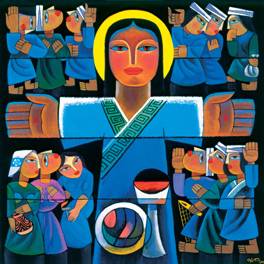Christmas Cycle
- Season of Advent
- Nativity of the Lord
- Sundays of Christmas
- Epiphany
Time after Epiphany
- Baptism of the Lord
- Sundays after Epiphany
- Transfiguration of the Lord
Time after Pentecost
- Trinity Sunday
- Sundays after Pentecost
- All Saints’ Day
- Christ the King
The Easter Cycle
The festivals and seasons of the Christian year (or liturgical calendar) offer a way to order the annual life of the church according to the life of Christ and the events of salvation history. The Revised Common Lectionary provides a set of Scripture readings from the Old and New Testaments that is both organized around the Christian year and attentive to the broad themes and narratives of the biblical story.

The Risen Lord, He Qi. Christ’s resurrection is the center of the church’s life and the Christian year
The Directory for Worship elaborates:
As God created and appointed days, God created a rhythm of time and appointed seasons for worship. In the Old Testament, people observed seasons of fasting and feasting as occasions for festival worship of God. Jesus kept these festivals. For the Church in the New Testament, the festivals were transformed in meaning and purpose by Jesus’ life and teaching, his death and resurrection, and by the gift of the Holy Spirit. Jesus’ birth, life, death, resurrection, ascension, and promised return give meaning to the seasons which order the annual rhythm of worship and guide the selection of lessons to be read and proclaimed in the life of the Church. (W-1.3013)
Through two millennia of Christian worship, a certain cycle of festivals and seasons has emerged and is now recognized and observed throughout the ecumenical church. Some of these events (Pentecost, Holy Week and Epiphany, e.g.) can be traced to the earliest centuries of Christian practice; others (Trinity Sunday and Christ the King, e.g.) developed later in the history of the church. The Directory for Worship provides a helpful outline of these festivals and seasons:
God’s work of redemption in Jesus Christ offers the Church a central pattern for ordering worship in relationship to significant occasions in the life of Jesus and of the people of God. The Church thus has come to observe the following days and seasons:
- Advent, a season to recollect the hope of the coming of Christ, and to look forward to the Lord’s coming again,
- Christmas, a celebration of the birth of Christ,
- Epiphany, a day for commemorating God’s self-manifestation to all people,
- Lent, a season of spiritual discipline and preparation, beginning with Ash Wednesday, anticipating the celebration of the death and resurrection of Christ,
- Holy Week, a time of remembrance and proclamation of the atoning suffering and death of Jesus Christ,
- Easter, the day of the Lord’s resurrection and the season of rejoicing which commemorates his ministry until his Ascension, and continues through
- the Day of Pentecost, the celebration of the gift of the Holy Spirit to the Church.
The church also observes other days such as Baptism of the Lord, Transfiguration of the Lord, Trinity Sunday, All Saints Day and Christ the King. (W-3.2002)
